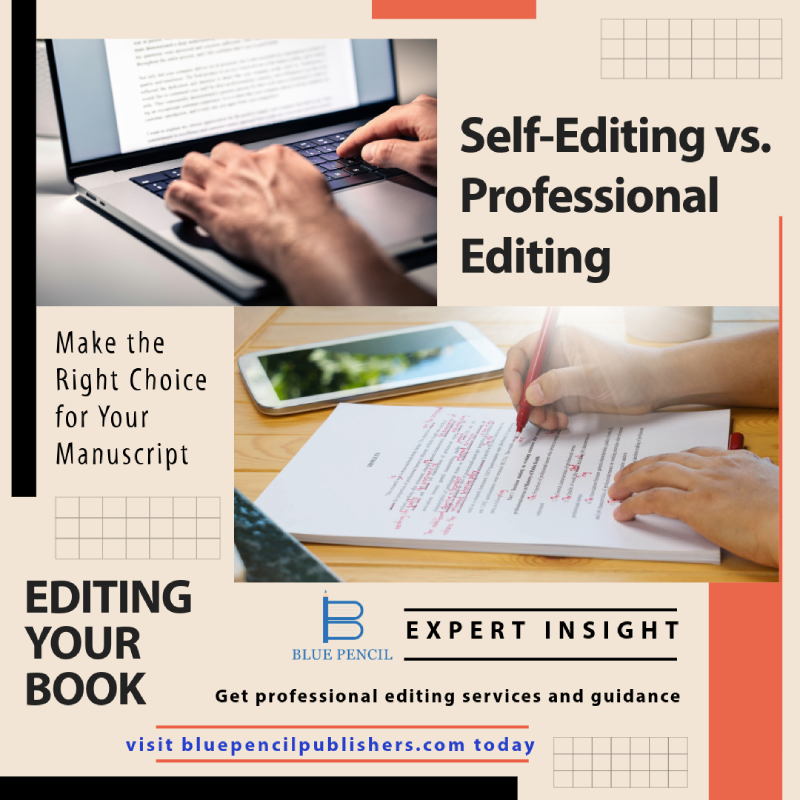Every writer faces a crucial decision in their publishing journey: when to rely on self-editing and when to invest in professional editing services. While self-editing is an essential skill for any author, understanding its limitations can help you make informed decisions about your manuscript’s needs. Let’s explore both approaches to help you determine the best path for your work.
The Power of Self-Editing: Essential Skills Every Writer Should Master
Self-editing is your first line of defense against common writing mistakes. Here are proven techniques to strengthen your self-editing process:
The Cooling-Off Period
Give yourself at least two weeks away from your manuscript before editing. This distance helps you approach your work with fresh eyes and spot issues you might have missed while writing.
Read Aloud Method
Reading your work aloud can help you identify awkward phrasing, run-on sentences, and rhythm issues. Your ears often catch what your eyes miss.
The Backward Read
Start from the last sentence and work your way backward. This technique prevents your brain from automatically filling in missing words and helps you focus on individual sentences.
Multiple Passes
Focus on different elements in each editing round:
- First pass: Overall story structure and flow
- Second pass: Character development and dialogue
- Third pass: Grammar and punctuation
- Fourth pass: Word choice and sentence variety
Understanding the Limitations of Self-Editing
Despite your best efforts, self-editing has inherent limitations that can affect your work’s quality:
Emotional Attachment
Writers often struggle to view their work objectively. That brilliant metaphor you love might actually confuse readers, but you’re too close to see it.
Knowledge Gaps
Even experienced writers can’t match the comprehensive knowledge of grammar, style guides, and industry standards that professional editors possess.
Blind Spots
Our brains naturally fill in gaps and correct errors in our own writing, making it difficult to spot issues that would be obvious to others.
Time and Energy Constraints
Thorough self-editing requires significant time and mental energy. After multiple revisions, fatigue can set in, reducing effectiveness.
When Professional Editing Becomes Crucial
Certain situations demand professional editing services. Here’s when you should seriously consider hiring a professional editor:
Publication Goals
If you’re planning to:
- Submit to traditional publishers
- Self-publish professionally
- Enter writing competitions Professional editing can give you the competitive edge needed to succeed.
Complex Projects
Professional editing is essential for:
- Academic works requiring specific style guides
- Technical manuscripts with specialized terminology
- Books targeting international markets
- Works requiring fact-checking and reference verification
Genre-Specific Requirements
Some genres have unique demands that benefit from specialized editing:
- Academic papers requiring adherence to specific citation styles
- Children’s books needing age-appropriate language
- Technical manuals requiring precise terminology
- Literary fiction demanding sophisticated language analysis
The Professional Advantage
Professional editors bring several crucial benefits to your project:
Industry Insight
Professional editors understand current market trends and publisher requirements, helping align your work with industry standards.
Objective Perspective
They provide unbiased feedback about your work’s strengths and weaknesses, helping you make informed revision decisions.
Technical Expertise
Professional editors ensure consistent style, proper formatting, and adherence to genre conventions.
Quality Assurance
They catch errors that automated tools and self-editing miss, from subtle grammatical issues to plot inconsistencies.
Making the Right Choice
The best approach often combines both methods:
- Begin with thorough self-editing to clean up obvious issues
- Use professional editing services to polish your work to publishing standards
- Return to self-editing for final reviews of the edited manuscript
Next Steps
At Blue Pencil, we understand the importance of both self-editing and professional editing. While we encourage authors to develop strong self-editing skills, we’re here to provide the professional expertise your manuscript needs to reach its full potential.
Ready to take your manuscript to the next level? Contact us today for a free consultation to discuss your manuscript’s editing needs. Our experienced editors can help you determine the level of editing required to achieve your publishing goals.










